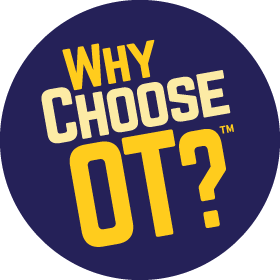What is an Occupational Therapist?
Occupational therapists, often called OTs, are licensed healthcare pros who help people do what they want and need in their daily lives so they can live life as independently as possible. They work with folks of all ages, from babies to seniors, who face challenges like physical, mental, or emotional issues.
What do OTs do?
OTs are creative, problem-solving heroes who help people relearn or develop new skills because of an injury, disability, or health setback.
They provide solutions to help people enhance their independence and improve their quality of life. OTs may find tools or gadgets that make life smoother, or make surroundings more suited to a person’s physical or mental needs. They value families’ involvement to help support their loved one going through occupational therapy.
OTs also supervise occupational therapy assistants (OTAs) who carry out treatment plans and help gather information about progress to help the OT make future decisions about the therapy provided.

How do OT practitioners help people?
OTs evaluate a person’s condition and needs and develop a personalized treatment plan to help them reach those goals.
OTs may adapt a person’s home, work, school, or other environments to help improve their independence. They work as part of a healthcare team and provide solutions to improve people’s quality of life.
Where do OTs work?
OTs work across various settings to help people get back to doing the things they love.
- Hospitals
- Rehabilitation centers
- Schools
- Nursing homes
- Mental health facilities
- Pediatric clinics
- Community health centers
- Private practice
- Workplaces
- In your home
- Education
- Correctional facilities
- Assisted living facilities
- Vocational rehabilitation programs
- Hand therapy clinics
- Assistive tech centers
- Hospice and palliative care
- And more!

Why do we need OT professionals?
So everyone can live as independently as possible with the best quality of life. OT pros:
- Help children who may have developmental delays or disabilities succeed in school and life
- Provide rehabilitation to people with illnesses, injuries, or disabilities so they can regain the ability to live meaningful lives
- Assist older adults in managing chronic conditions, adapting to age-related changes, and maintaining their independence
- Enhance daily function of individuals living with arthritis, multiple sclerosis, Parkinson’s disease, and so many other chronic conditions
- Help people address mental health challenges by developing skills and strategies to manage and improve mental well-being while addressing the impact on their daily lives
- Create safe and ergonomic work environments to reduce risk of workplace injuries and improve productivity and comfort
- Integrate people with disabilities or mental health challenges into their communities
- Recommend assistive devices and technology that can improve an individual’s ability to do their daily activities
- Advocate for the rights and needs of their individual clients by helping them access appropriate healthcare services, educational accommodations, or assistive devices.
- And so much more!
Are you curious about a career where you can make a real impact on people’s lives while having flexibility and job security?
Learn about how to become an Occupational Therapist!
